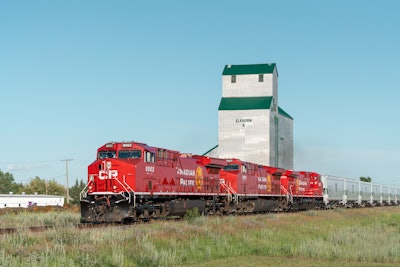
Canadian Pacific Railway Ltd. and Kansas City Southern have jointly filed a railroad control application with the Surface Transportation Board (STB) regarding the proposed transaction to create Canadian Pacific Kansas City (CPKC), the only single-line railroad linking the United States, Mexico and Canada.
"We are excited to file our joint application for this unique, pro-competitive combination and once-in-a-lifetime partnership," says Keith Creel, CP president and CEO.
"CPKC is an extraordinary opportunity to inject new competition and new capacity into the U.S. rail network, further USMCA trade flows, improve safety, grow employment and facilitate new passenger services. We are ready to work with the STB as the board gives this transaction a thorough and appropriate review, and ultimately look forward to approval so we can get to work delivering these benefits to the North American economy."
Patrick J. Ottensmeyer, KCS president and CEO says CPKC will provide new routes, reach broader markets and create expanded shipping opportunities for customers.
"This combination will also unlock new infrastructure investment and environmentally-friendly supply chain transportation options that will grow the USMCA economy," Ottensmeyer says.
The comprehensive control application provides an overview of the proposed operational integration of the CP and KCS rail networks, the impact of that consolidation on the companies' finances and labor needs, and the anticipated competitive and other benefits that will flow from providing shippers with new and better transportation alternatives.
Information in the filing outlines the public and customer benefits a CP-KCS combination would bring, including more efficient north-south trade arteries to support the interconnected supply chains of the United States, Mexico and Canada.
In addition to the central foundation of the transaction to invigorate transportation competition and support economic growth across North America, the CP-KCS combination will generate many other public benefits, including:
- The creation of more than 1,000 direct new jobs system-wide, including approximately 760 in the United States, over the next three years brought about by expanded rail operations across the combined network
- Capital investments in new infrastructure of more than $275 million over the next three years to improve rail safety and capacity of the core north-south CPKC main line between Louisiana and the Upper Midwest
- Avoidance of more than 1.5 million tons of greenhouse gas (GHG) emissions within five years due to the improved efficiency of CPKC versus current operations
- Diverting 64,000 long-haul truck shipments to rail annually with new CPKC intermodal services, eliminating another 1.3 million tons of GHG emissions over the next two decades, saving $750 million in highway maintenance costs
Rail customers will not experience a reduction in independent railroad choices as a result of the CP-KCS combination. The joint control application reiterates the applicants' commitment to keep all existing freight rail gateways open on commercially reasonable terms, including the Laredo gateway between the United States and Mexico, and shows how customers will not lose competitive routings because no new regulatory "bottlenecks" are being created.
It also describes how the combined company will compete aggressively to attract traffic to its network via new single-line lanes between Canada, the Upper Midwest and the Gulf Coast, Texas, and Mexico.
More than 960 stakeholders, including more than 440 shippers, 186 smaller railroads, dozens of public officials, eight major ports, railroad labor unions representing both CP and KCS employees and 289 rail industry suppliers have written letters to the STB supporting CP's proposed combination with KCS.
The STB review of CP's proposed control of KCS is expected to be completed in the second half of 2022. Upon obtaining control approval, the two companies will be integrated fully over the ensuing three years, unlocking the benefits of the combination.
While remaining the smallest of six U.S. Class 1 railroads by revenue, the combined company would have a much larger and more competitive network, operating approximately 20,000 miles of rail, employing close to 20,000 people, and generating total revenues of approximately $8.7 billion based on 2020 actual revenues.
For more information, click here.
RELATED READING
CP Makes New Offer to Acquire KCS
CN to Combine with KCS
CN Takes Lead in KCS Bidding War
CN Purchases 1,000 New Hopper Cars
Impact of Rail Merger
Merger Creates First U.S.-Mexico-Canada Rail Network
Kansas City Southern Rejects $20B Takeover

















